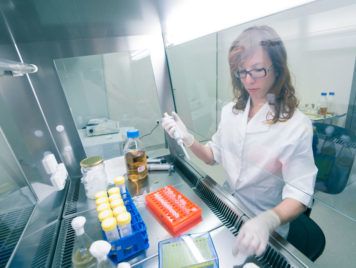
HEPA filters, found inside your biosafety cabinet or air purifier unit, are an important part of the cabinet assembly. They perform a crucial role in removing contaminants from the work area and filtering harmful airborne chemicals. And when those filters fail (and need replaced), your unit won't operate correctly.
For that reason, you need to do everything you can to maintain the health of your filter and keep it as clean as possible. When you do, you'll keep your staff safe while significantly reducing costs over the cabinet's lifetime. The costs associated with filter replacement quickly add up – here's what you need to know about keeping your filter in the best possible condition.
Let's start with the basics – what are HEPA filters anyway? You can read a more in-depth version in one of our other resources What Are HEPA Filters and How Do they Work, but here are the basics.
High-efficiency particulate air (HEPA) filters are an essential part of any biosafety cabinet. They do what you'd expect them to do, in that they filter potentially harmful micro-organisms from the air. It should be noted that they do not remove vapours.
There are many different types of filters with different properties and efficiencies, and they'll manage particles of different sizes. Make sure that you select the correct HEPA filter for the materials you'll be using and the chemicals you’re likely to be working with.
These filters provide safe and clean air into the cabinet to protect any samples or materials from potential contamination. That air is also passed through the HEPA filter before it's exhausted (making it safe to exhaust to atmosphere).
It goes without saying that keeping the filter clean is crucial. When the filter stops doing its job, there could be very serious – and costly – consequences.
So how long should the filter last? How often do you need to clean it, and when does replacement simply become inevitable? Will a filter housing prolong its lifespan?
There's no straightforward answer. Ultimately, the life expectancy of your filter depends on the nature of lab experiments, the hours of cabinet operation, and the lab's cleaning procedures.
When kept in optimum conditions, you can expect your filter to operate efficiently for between 5 to 10 years – but they need to be looked after. Care and maintenance begin with the cabinet assembly, and by ensuring that biosafety cabinet fans and exhaust systems are sufficient.
As filters do their job, they gather particles and therefore become less efficient. Class II Type A biosafety cabinets have been designed to accommodate this and, alongside balancing dampers, their internal fans will compensate for the filter becoming less effective. Design standards have been put in place to ensure that biosafety cabinet fans and exhausts work in tandem with HEPA filters so that clean air is always in circulation. Make sure that you know which type of cabinet you're purchasing, and whether or not it will meet the requirements you're looking for.
These HEPA filters aren't cheap, and the replacement procedure isn't either. That being the case, you'll want to do everything you can to keep your filter operational for as long as possible and keep operational costs low. First of all, consider using a safe-change filter housing.
Next, study the cabinet design. What Class of cabinet do you need? And is it the right type? There will be detailed information about the internal fan and balancing damper arrangement – make sure that it can handle a pressure drop of at least 50% to accommodate a 'loaded' HEPA filter. Often, the best way to prolong the life of your filter is to use other tools and parts that contribute when the filter isn't 100% clean.
You can also optimise the air volume within the cabinet, and opt to install a motor reserve within the cabinet itself. Make sure that you're purchasing the correct size of filter – if it isn't appropriate for your lab procedures, then it will become loaded and less effective much quicker.
DOP testing is a vital part of the maintenance process. At the end of the day, these filters are mechanical parts like anything else you'll find in the make up of your unit, so you need to make sure the filters are regularly tested and inspected to identify any faults with them or the ventilation system.
Finally, maintain a clean and healthy lab. When you do this, you'll have cleaner, more sterile air everywhere within your facility. Your cabinets won't need to work as hard, and you'll be working with higher-quality air.
Unfortunately, at some point, and for whatever reason, every filter reaches the end of its life expectancy. That's when replacement is inevitable, and you'll need professional help to safely remove the existing filter and replace it with a new one.
If your HEPA filter is placed inside housing – and it should be – then the replacement procedure is significantly easier. The safe-change housing provides extra protection in the event of an accident. Again, it must be stressed that only qualified professionals should be handling these complex housing assemblies.
Follow this advice and you'll keep your filter in sufficient condition. Your staff can carry out their duties safely, your cabinets are effective, and you'll know that costly filter replacements will be few and far between.
If you'd like further advice on extending the life of your HEPA filters and making sure they're in optimum condition, please get in touch with our team.